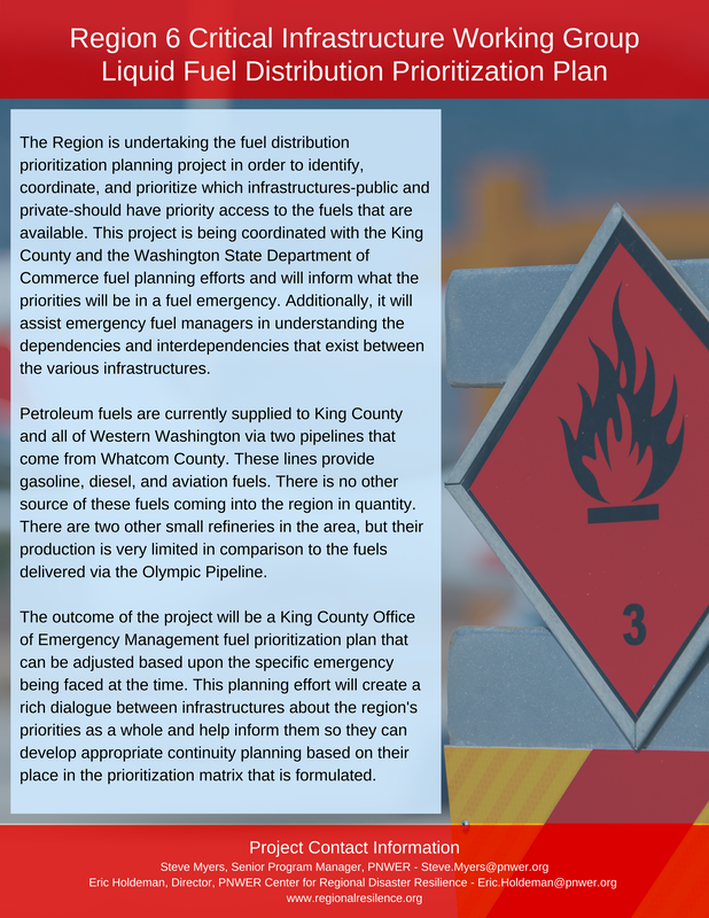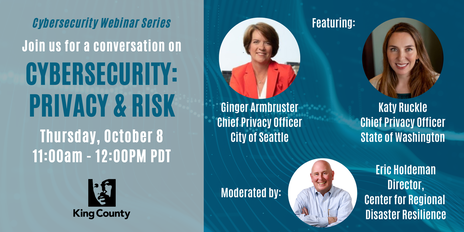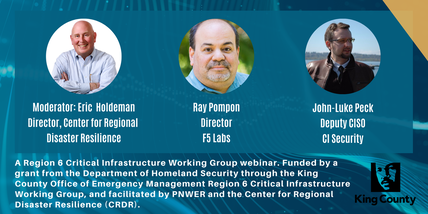|
While we could not meet in person this year, the Idaho Cybersecurity Interdependencies Summit was able to move online and present three great webinars during the month of October!
0 Comments
PNWER has been awarded an EDA Grant to develop a Comprehensive Regional Pandemic Resilience Roadmap following the COVID-19 pandemic. This will be an opportunity to build upon PNWER's previous work in 2010 on a Comprehensive Community Bio-Event Resilience Action Plan following the H1N1 pandemic. The primary focus of this project is to produce a Roadmap to improve capacities of communities to safely and successfully address the challenges and economically recover from a pandemic. The project will identify gaps, examine what can be improved, and define an implementation plan for best practices and methods identified nationwide with a cross-sector and multi-discipline approach. Shortening the period of maximum economic constraint will do much to limit the economic damages done to individuals, families, and small businesses. This effort will also provide valuable lessons learned that can be used immediately and shared with other metropolitan areas across the United States facing similar challenges. The Roadmap will include a playbook for use by other regions of the nation. The Comprehensive Pandemic Resilience Roadmap will incorporate lessons learned from COVID-19 pandemic and pandemic resilience best practices with a strong focus on economic challenges in the context of health safety, the implications for preparedness, response, recovery, and mitigation, and identify needs and respective improvement actions. The Roadmap will help with the present pandemic and prepare the Central Puget Sound for future pandemics while at the same time assisting in lessening future blows to the economic welfare of the region, by enhancing capacity of local governments, economic development agencies, and business associations to be better prepared for safe operation, and economic survival. The COVID-19 pandemic has highlighted a host of additional complex issues and shortfalls, including unexpected, deleterious, and far-reaching repercussions for local and regional economies that demonstrate limited understanding of and capabilities to address competing interests and needs in the context of inter-related economic and health resilience demands. These challenges cut across the resilience mission areas of protection, preparedness, mitigation, response, and recovery, and include an extensive range of new needs. Looking just at economic recovery, issues include healthcare and business supply chains; human resource considerations, such as protecting staff, sick leave, emergency leave, flexible child-care arrangements, dealing with ill workers, telecommuting, insurance coverage, etc.; better informed and coordinated decision-making across communities to address risks associated with business closure and restarts, quarantines, and social distancing versus health impacts; and how to keep businesses and other entities in operation and attract new investments and economic development opportunities. An overarching challenge is how to address the impact of social media on public behavior, fears, and attitudes that have a direct bearing on economic recovery. Beyond this, communities and regions need to not only recover, but they need to have the resources, tools, and other capabilities to build and sustain pandemic resilience to thrive and grow.
During this webinar, speakers explored how organizations can address cyber threats and weaknesses through readily-available and existing low-cost resources, toolkits, and training programs. They discussed the challenges and solutions for small to medium-sized organizations to prepare for and respond to the challenges of working from home. Panelists include:
For information related to Idaho's COVID-19 response, please see https://coronavirus.idaho.gov/ This is an ongoing project. Please check the Liquid Fuel Planning Project page for the most up-to-date details.
King County Region 6 Critical Infrastructure Working Group Cybersecurity Webinar Series
Cybersecurity: Privacy and Risk
Small and medium-sized organizations - including businesses, state agencies, county and city governments, local districts, educational and healthcare institutions - all need guidance and suggestions for cybersecurity planning during the time of COVID-19 and the shift to working from home. During this webinar, speakers suggested templates, tools, and best practices for cyber continuity and cyber pandemic planning as employees continue working at home. Panelists include:
For information related to Idaho's COVID-19 response, please see https://coronavirus.idaho.gov/ King County Region 6 Critical Infrastructure Working Group
Cybersecurity Webinar Series
Cyber Threats & Trends: Impacts to the Connected Worker Today’s workforce is more connected than ever before. The onset of COVID-19 has brought about new challenges and vulnerabilities. There has been a massive shift in the workforce to employees working from home. This webinar explored the latest threats and trends that cybersecurity professionals, policymakers, business owners, emergency managers, first responders, critical infrastructure operators, and all public and private sector stakeholders should be aware of. Experts discussed how employers can safeguard connected devices and protect employees. They explored the future of cybersecurity, latest threats, updates, resources, and cyber best practices. The shift to working from home has created numerous cyber vulnerabilities and Human Resources challenges. With employees when sharing networks and devices with family and/or roommates for work, education, and entertainment, this creates unique security challenges for companies to work through. The human element of our changing work realities was another major topic, especially roller coaster productivity, mental health, and stress of learning everything at once, combined with the psychology of working remotely and not physically with peers. This webinar also explored the successes and challenges of serving public expectations of performance in a different reality. Speakers include:
For information related to Idaho's COVID-19 response, please see https://coronavirus.idaho.gov/ King County Region 6 Critical Infrastructure Working Group
Cybersecurity Webinar Series
The Ever-Changing Role of the CISO and the Future of Cybersecurity Leadership during a crisis is crucial. The Chief Information Security Officer (CISO) is an essential and dynamic position that guides organizations towards safe IT operations in today’s digital workplaces. This webinar hosted a panel of expert CISOs from the public and private sector to discuss the changing role of the position and the future of these organizations in the virtual world. Speakers explored the impact of COVID-19 on how organizations are assessing cyber risk, security, and workforce challenges, and the impact this has on the role of a CISO. They discussed ways to create more resilient organizations with better cyber hygiene in part through clear communication from leadership. Moderated by Alicia King, State of WA IT "WaTech" Speakers:
The CRDR held a session on the future of drones during PNWER's 2019 Economic Leadership Forum in Seattle, WA. The Forum's program concluded with a robust look at the future of drones and the role that they can play in different aspects of our world. Drones are being utilized in ways that would seem impossible just a few years ago. The session was moderated by Charlton Evans, End State Solutions, and featured Tom Hagen, AUVSI-Cascade Chapter; Bryan Norton, City of Boise; and Douglas Spotted Eagle, Sundance Media Group. The manufacturing and innovative drone technologies happening right here in the Pacific Northwest gives us the chance to be a world leader on drones. This is a fast-evolving industry, and drones are being used to mitigate disasters, inspect critical infrastructure, increase public safety, and more. However, the speakers identified a major issue to the opportunities and effective use of drones which is misinformation and false perceptions regarding the legality and uses of this technology. Tom Hagen said, "We need more informed legislators, homeowners, drone users, and others. We need laws that allow the technology to work, but we need to work on education. PNWER is one way to do this educational outreach & bridge this gap." Douglas Spotted Eagle stated, "Technology is not to be afraid of. It is to be understood."
Presentations: Douglas Spotted Eagle, Sundance Media Group LLC Presentation Tom Hagen, AUVSI Presentation |
Categories
All
Archives
October 2021
|




